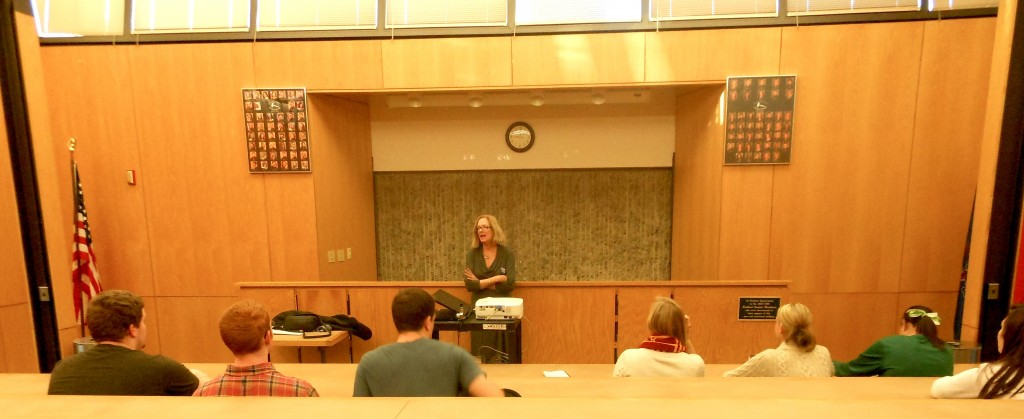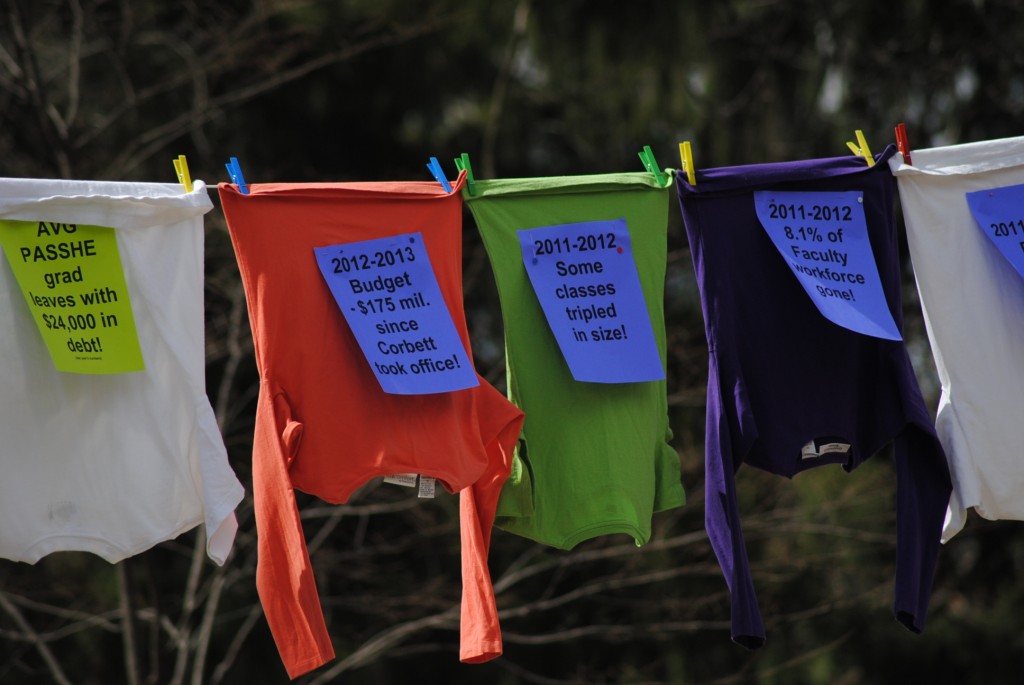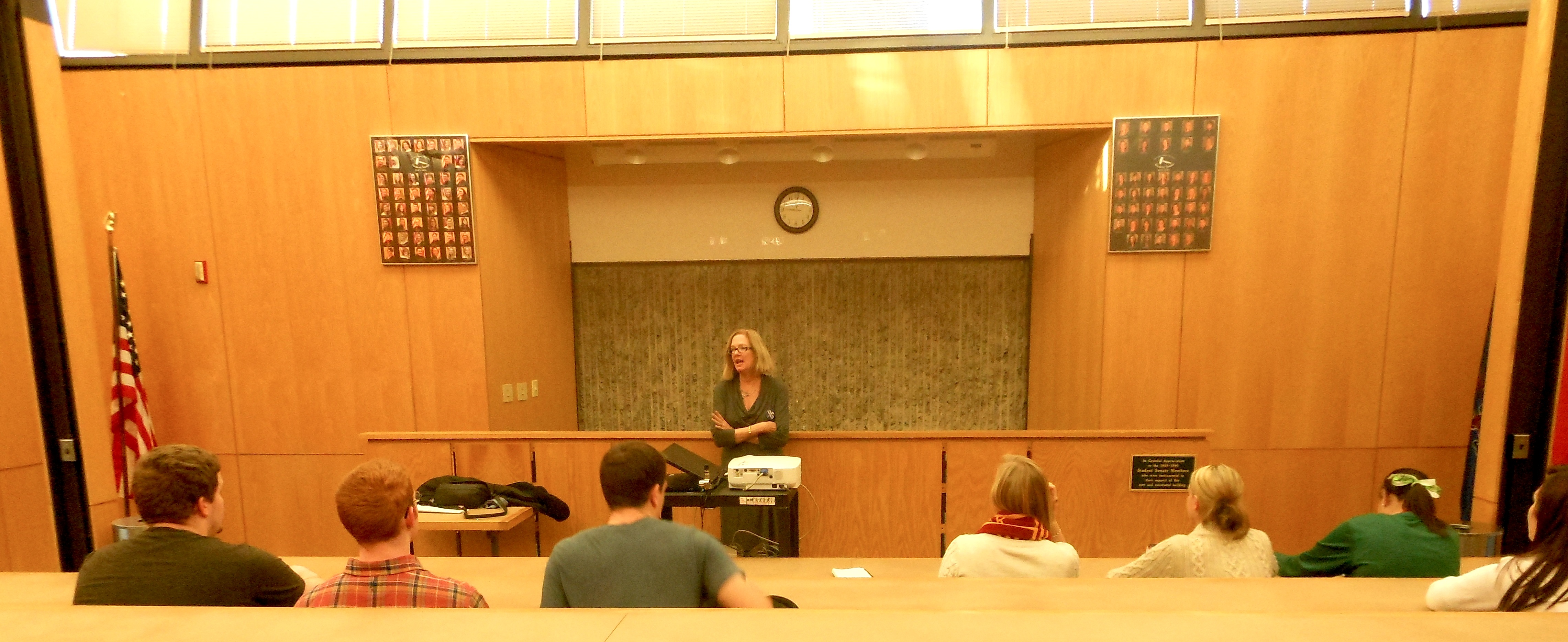

Photo Credit / Dana Reese
By Dana Reese
Editor in Chief
The Association of Pennsylvania State College and University Faculty (APSCUF) and the Pennsylvania State System of Higher Education (PASSHE) are locked in contract negotiations. On October 20, APSCUF delegates from each of the 14 state system Universities traveled to Harrisburg for a special meeting, and voted unanimously in favor of strike authorization.
This is the first of a series of votes that could lead to a future faculty strike at all 14 PASSHE universities.
The negotiations are an attempt to agree on new faculty and coach contracts, and they have been in the works for over a year. Faculty and coaches at the 14 state universities have been working without contracts since June of 2011.
East Stroudsburg University (ESU) APSCUF sent six delegates, including Dr. Van Arsdale, English Department Chair and President of ESU APSCUF, and Dr. Mash of the political science department and Vice President of APSCUF statewide. The strike authorization vote was a result of the State System’s refusal of binding arbitration.
In September, APSCUF put a deal on the table requesting binding arbitration with the State System, and they set a final decision date for October 15. In a case of binding arbitration, both parties would submit their requests and arguments to a third party delegate. The third party would then decide on a compromise that both sides would be bound to accept.
This is not the first time APSCUF has proposed binding arbitration, nor is it the first time PASSHE refused to allow a third party into the negotiation process.
On Monday, October 15, the last day for the state system to respond, Chancellor Cavanaugh sent APSCUF’s president, Dr. Steve Hicks, a letter declining the offer for binding arbitration.
“We believe it would be improper to delegate those responsibilities to a third party arbitrator who does not have the responsibility or duty to consider the financial implications of their decisions and who is not obligated to take into account the interests of Pennsylvania taxpayers or the long-term effects of those decisions on the Commonwealth or PASSHE,” wrote Chancellor Cavanaugh. The letter was posted two days later on the PASSHE website, where any interested party may view the contents.
The day after the Chancellor’s letter was published online, Dr. Hicks released a response from APSCUF on their website in the form of a published letter to Cavanaugh.
“Certainly, if you are convinced that your bargaining positions are supported by reason, you should not hesitate to submit to an impartial review,” Dr. Hicks wrote. The letter continues to list generalized versions of APSCUF’s requests. Dr. Hicks ended his letter, writing, “Please be fair to the faculty that you have recognized as the “heart of our universities.””
After the strike authorization vote on October 20, APSCUF at the PASSHE schools have begun early preparations for a strike, though it is not certain yet whether the negotiations will reach that level. In order to decide, votes for all APSCUF members in the state, rather than advisory boards and delegates from schools, will vote over a three day period from November 12-14.
At this point, ASPCUF has not set any date for a strike, but both sides are making preparations. Dr. Van Arsdale distributed strike manuals to some faculty on Wednesday, October 24. Depending on the full member vote results and negotiations, the strike process will continue to move through APSCUF regulations. Then, what happens if APSCUF decides to strike?
“Each campus has a contingency plan it would implement in the event of a strike,” said Kenn Marshall, Media Relations Manager in the Office of the Chancellor, responded.
“The goal of every contingency plan is to keep the campuses open, to ensure students and employees are safe and to keep studen
ts on schedule toward the completion of their degrees.”
This is not the first time negotiations between the State System and APSCUF have reached the level of a strike risk. According to Dr. Van Arsdale, the State System has practiced similar negotiating tactics for the past 20 years.
“It seems the state system won’t get serious about negotiations without a strike vote,” said Dr. Van Arsdale. “Faculty just wants to teach their classes. APSCUF has never gone this long without a contract.”
As of now, due to Pennsylvania labor laws, the faculty and coaches have been working under the terms of their previous contracts. As long as negotiations continue and the faculty does not strike, they will continue to work under the old contracts until an agreement is reached. As of right now, each side has committees made up of members throughout the PASSHE system. The Chancellor has a selected board of officials from the state, including some university Provosts and other office workers from Harrisburg. APSCUF relies mostly on their negotiating team and committee. The committee is comprised of each president from the 14 PASSHE universities, while the team is made up of a few select members, such as Dr. Hicks and Dr. Mash.
Each side has hired legal representation as well. Stewart Davidson, a labor law specialist, represents APSCUF at the negotiating table.
The contract negotiations have been stuck on a few subjects, including pay rates for temporary faculty, certain retirement benefits, pay increases, healthcare and the compensation faculty members receive for teaching distance education courses.
Students present at last March’s rally on the front steps of Stroud Hall may remember the hanging shirts used to represent faculty lost because of funding cuts. For the coming contract, PASSHE has proposed a 35% percent cut to temporary faculty salaries, according to Dr. Van Arsdale. For a temporary professor with a full course

Photo Credit / Kelly North
load who is currently making about $45,000 a year, this would mean their income would be cut to about $30,000, while they would still be doing similar or the same amount of work as other full time professors. The starting salary for a tenure track professor at ESU is about $57,000.
In perspective, about a quarter of ESU’s faculty work as temporary professors, according to Dr. Van Arsdale.
“The state system has found plenty of money for substantial pay increases for top executive positions,” said Dr. Van Arsdale. “Then they want to cut pay for the lowest paid faculty. That seems unfair to us. Protecting temporary faculty: that is our number one issue.”
As well, 60% of temporary faculty are women, and it would shift the pay scale balance unfairly, according to Dr. Van Arsdale’s open forum talk on November 6.
“These cuts would put their salaries down to a level eligible for food stamps,” she told the collected student audience.
Dr. Van Arsdale listed examples from the large difference between the Chancellor’s salary and a temporary faculty member, and also the pay increase newly instated ESU President Dr. Welsh received over past President, Dr. Dillman.
“The proposed changes in pay for temporary faculty would better reflect regional rates at other colleges and universities while assuring that PASSHE universities remain competitive employers,” responded Marshall, when asked about the salary cuts.
When asked what PASSHE was looking to get from the negotiations, Kenn Marshall cited the effects the decisions in the contracts will have on students.
“All of our labor agreements must include cost savings that will help ensure our universities can continue to provide high-quality, affordable education to our students into the future,” replied Marshall. “We have reached agreements or tentative agreements with our six other labor unions that achieved those goals. They all worked with us on behalf of our students. We remain hopeful APSCUF will do the same.”
He also mentioned PASSHE’s goals in the contract’s healthcare plans. According to Marshall, by moving APSCUF to the state healthcare plan, which covers over 80,000 employees, including 4,300 PASSHE employees and the Governor, the State System could cut costs.
“By aligning benefits, we can ensure all of our employees receive essentially the same level of healthcare while also reducing costs. Our other unions whose members are covered by this plan all have agreed with this concept; APSCUF has refused to consider it, and, in fact actually is asking for additional benefits that would increase PASSHE’s costs by more than $5 million a year.”
On October 20, ESU students received an email about the the strike authorization vote, stating “It is important for you to know that this is NOT A VOTE TO STRIKE.”
On October 23, a second email went out to ESU students from Dr. Welsh, stating, “I remind everyone that it is important for us all to continue to work together to ensure a positive educational environment for our students. Time spent discussing the strike vote and/or any issue related to negotiation of the APSCUF contract should not be discussed in the classroom. Instead, we emphasize that faculty will remain committed to ensuring their classes are focused on the academic material in the respective syllabi.”
In a survey of 79 ESU students on November 1 and 2, a majority did not understand or were not aware of the negotiations. 24 students responded that they did not know any negotiation process was happening.
As well, 13 students responded that they believed there would be a strike, while 63 responded maybe or that they were not sure.
Despite the emails, only about 10% of students felt they were adequately informed about the situation by ESU officials, and out of the 8 students who responded that they had been adequately informed, 6 had been talked to during class periods by professors.
At the open discussion with students on November 6, Dr. Van Arsdale took questions from the audience. About 10 ESU students collected in Student Senate Chambers, including members and president Lauren Zirkelbach from Student Senate. Most concerns dealt with the effects a strike might have on graduation and the institutions abilities to continue its commitments to students.
Lauren asked questions applicable to students, specifically if the possibility of a strike was serious. Dr. Van Arsdale replied yes. Lauren then asked a possible strikes impact on graduation dates. Dr. Van Arsdale told students to look toward the provisional plans other large teacher strikes have taken in the past, specifically the Chicago public education strikes. Dr. Van Arsdale reminded students a strike was not a definite result.
“We have never gone on strike yet as a faculty union.”
The APSCUF member strike votes will be conducted from November 12-14. All APSCUF members will be asked to vote for or against strike authorization for the negotiation staff. This does not mean there will necessarily be a strike, but rather, that the negotiation team will be able to use the union approval of a strike as leverage at the negotiation table.
At each university, members will submit a single vote after showing proof that they are members of the union. The votes will then be delivered overnight to Harrisburg, where the total numbers will be calculated. It is projected that the union will know the final results by Friday of that week. The decision is based on a simple majority vote. As Dr. Van Arsdale described it, there had yet to be a situation where a majority of APSCUF voted against a request for strike authorization.
According to APSCUF’s website, they represent over 6,000 coach and faculty within the 14 state universities.
“PASSHE is the 13th largest employer in the state, with more than 12,150 professional and support staff,” according to PASSHE’s website. “The 14 Pennsylvania State System of Higher Education…universities offer the lowest-cost four-year baccalaureate degree programs in the state.”
Between the amount of employees, the cost to students and the expectations tax-paying Pennsylvanians have on any state system, the budgeting of Pennsylvania’s monetary priorities remains a problem to state supported higher education. As cuts come from the past two years’ budgets to PASSHE in a trickle down scenario, students and unions alike are forced to carry some economic weight.
Many think the state system, in its attempts to cut costs by cutting faculty, increasing class sizes and paying temporary faculty less, is trying to take what they call affordable, public education, and turn it into a business.
“Where is the Chancellor when we need him to fight for public higher education?” asked the APSCUF blog in an October 2 post. “He is openly advocating for a business model approach to higher education.”
APSCUF and Dr. Van Arsdale plan to continue fighting.
“We were patient during negotiations… all of last year. We’re willing to take the same deal other unions have taken. Our goal is not to block your education,” explained Dr. Van Arsdale to students at the open forum. “We want to protect our profession.”
Email Dana at:
dmr3170@live.esu.edu

